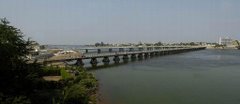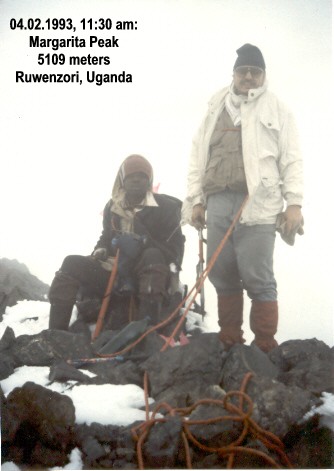Am Geld liegts nicht ...
. . . eher schon an verzerrten, ungerechten internationalen Strukturen, paternalistischen, uns bevorzugende Entwicklungs-"Strategien", etc.
Dazu steht genug in diesem Blog!
Aliu weeps for Africa
…As continent wallows in abject poverty
Charles Takyi-Boadu reports | Posted: Wednesday, September 26, 2007
| Vice-President Alhaji Aliu Mahama |
He could not comprehend why in the midst of plenty natural and human resources, the continent was still deprived.
Alhaji Aliu Mahama could also not understand why we have had development economists and governance experts like Professors Adedeji, SKB Asante, K.Y. Amoako and others at the UN, ECA and ECOWAS level who have attempted to provide prescriptions from an African perspective “yet we are unable to deliver wealth to our people.”
“We are not poor in the Sub-region. We have adequate natural, mineral and human resources including miles of arable lands, water, oil, gold, diamonds and others. We have very learned and intelligent people who have distinguished themselves in the service of their nations and Africa at large, yet we are told that over 40% of our people live below the international standard of a dollar a day,” he lamented.
The Vice-President expressed this concern when he took his turn to address the 2nd Daily Graphic Governance Dialogue under the theme: “Accelerating Regional Integration for Wealth Creation and Sustainable Development” in Accra.
In spite of its rich natural resources, Africa gets only 2% of world trade.
“Illiteracy is high, life expectancy is low, infant mortality is high, and the threat of hunger and disease is never far away,” he emphasised.
For him, Africa’s problem has always been the lack of sustained visionary leadership of institutions.
“I also think that the outmoded notion of governance as the preserve of the elite in a prescribed political arrangement in the past has now given way to one of a collaborative partnership involving political actors and civil society and the private sector,” he noted. He went on to stress that the widening of the political space to accommodate all the actors was good for the continent’s development.
The Vice-President therefore called for the strengthening of institutions and the implementation of policies since, according to him, most of the reports and agreements that purport to support poverty alleviation in Africa list poor capacity and weak institutions as the main challenges.
To succeed in accelerating change, the Vice-President stressed the urgent need to consciously bring services on board in order to communicate objectives and alternatives to dispel the insecurity associated with changes.
In effect, he emphasised that the reality of governance is the ability to mobilise, mediate and focus scarce social resources in a manner that best meets the aspirations of the greater number of people without neglecting the weak and voiceless.
On his part, renowned Economist and Chairman of the Public Utility Regulatory Commission, Kwame Pianim, who gave the keynote address, stressed the need for a sub-regional integration.
This, he said, was because the trend in the world was the formation of regional groupings where nations give up their sovereign powers in order to benefit from the economies of larger groupings.
To accelerate sub-regional integration, he said, “We must reorient the infrastructure of our national economies from their colonial north-south direction to east-west.”
As a first move, he stressed the need for transport links to serve sub-regional commercial demands.
“These are potentially good years for Africa to make a quick dash out of the cycle of poverty in which we have been mired for so long,” he said.
>> Quell URL


